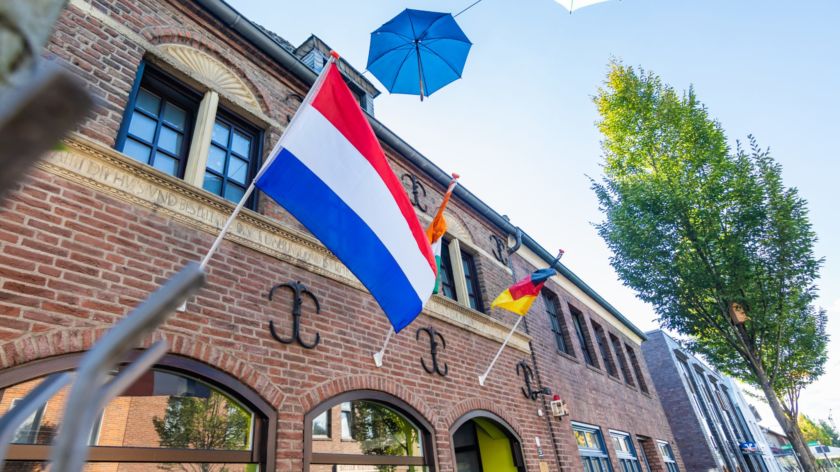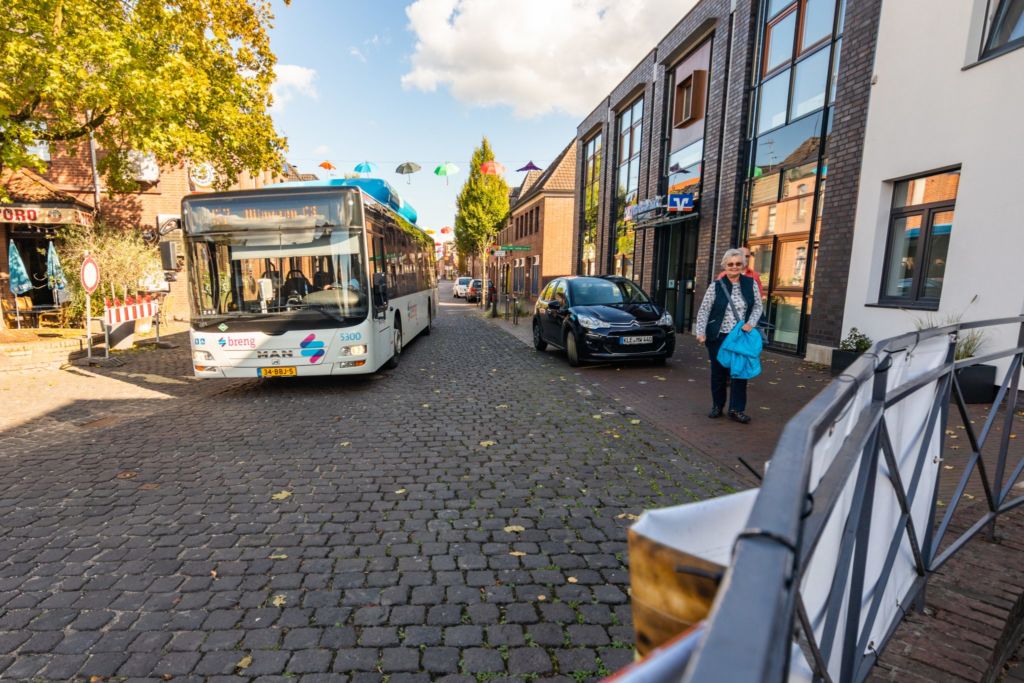Why some German students prefer to live in Kranenburg
-
 A Dutch flag in Kranenburg. Photo: Marjolein van Diejen.
A Dutch flag in Kranenburg. Photo: Marjolein van Diejen.
Cheaper, quieter, lower parking fees. These are three reasons German students from Radboud University choose to rent a room in Kranenburg. ‘If you like peace and order, you’re in the right place.’
Just another Friday night in Kranenburg. At Bäckerei Derks an elderly couple take a bite of an appetising plum tart, the bus to Nimwegen makes its way through the Grosse Strasse, decorated with umbrellas. At restaurant El Toro, which serves Balkan specialties, waiters prepare for what they hope will be a busy night.
On the neighbouring market square, where a fountain shaped like a bull’s head sprays water, we are waiting for Miriam Panning. The German Psychology student was originally planning to study in her home country. She only found out she was coming to Nijmegen in August. All student rooms in the city were already taken. From a fellow student she heard there was always space in Kranenburg. She now rents a room for €275 a month.
Bäckerei
Panning has just come back from a visit to her parents in Munster, and parks her car on the Kranenburg market square. ‘More or less three quarters of the students here have a car,” she says. “It’s not necessary, but it does make life easier.’
The bus ride to Nijmegen takes one and a half hours. And cycling 15 kilometres to the University – one way that is – is a bit far. Via WhatsApp students with a car can indicate when they plan to drive to Campus, and arrange to meet car-poolers on the carpark opposite Bäckerei Derks, or in front of the bridal boutique on the other side of the Grosse Strasse – where most students live.
According to Panning, the German students in Kranenburg are all alike. ‘As a rule, the more introverted students end up in Kranenburg. If you enjoy peace and order, you’re in the right place. The cafés are for older people – students are rarely seen there. Attending a party in Nijmegen means a long ride there, and you have to arrange to spend the night with friends.’
Foodies
No matter how cosy and friendly, Kranenburg’s small scale also has disadvantages. Student jobs are scarce. ‘When a new shop opens here, there are a hundred students immediately begging for a job,’ says Panning. The local GP has a waiting list and his closest colleague lives more than ten kilometres away, in Kleef. ‘Not very convenient if you have a high fever.’

Foodies have little to sink their teeth into in Kranenburg. With the exception of El Toro, El Paso and Schnellrestaurant Peters, the village offers few gastronomical venues. The only falafel bar didn’t survive very long. Most students cook for themselves. ‘Sometimes we order pizza or a kebab,’ says Miriam. ‘It’s cheap, but not particularly tasty. And because of Kranenburg’s isolated position, it doesn’t make sense to order take-away.’
No wonder many students eventually give up on Kranenburg and move to Nijmegen. Occasionally, someone makes the opposite move. ‘Last week a friend of mine moved to Kranenburg: she didn’t feel at home in Nijmegen because it’s so busy and costs a lot to park. This is something German students often complain about.’
Landlord
In 2006, the Dutch made up 20% of the Kranenburg population, a figure that has probably increased since then. One of Panning’s neighbours is also from the Netherlands. Panning understands their choice. ‘In Kranenburg they can afford houses they could never build 500 metres away.’ And yet, according to the Psychology student, Kranenburg feels like its German. ‘Just look at the traffic signs and the products on the shelves. I speak German at the bakery, and with my landlord. You couldn’t do that in Nijmegen.’
The busiest place in Kranenburg? Undoubtedly the shopping centre. Even on Friday afternoons, the carparks for Penny, Aldi and Rewe are half full, mainly with cars with Dutch number plates. This sometimes leads to frustration among German students. ‘Products on sale are often immediately sold out. The Dutch come here to do their bulk shopping, from thirty pheasants to forty litres of olive oil.’ She does all her shopping on Thursday or Friday mornings – the earlier, the better. ‘If you go later, the shelves are half-empty, and there’s only rotten fruit left.’
Panning is not planning to move to Nijmegen yet. ‘Nijmegen is a great city, but not if you have a car. And I don’t speak Dutch. For me, it’s much easier to live in Kranenburg. The houses and groceries are cheaper here, it’s cleaner, and people are less closely packed together. But you should never say never: if I find a good job in Nijmegen, I’ll certainly consider it.’
‘All students are welcome’
‘Many students who study in Nijmegen or Kleef rent rooms in Kranenburg,” says Mayor of Kranenburg Günter Steins. “We don’t know precisely how many students live here: when people register with the municipality we don’t ask them whether they are students. As a municipality, we don’t organise any special activities for students, but all students are more than welcome!’



